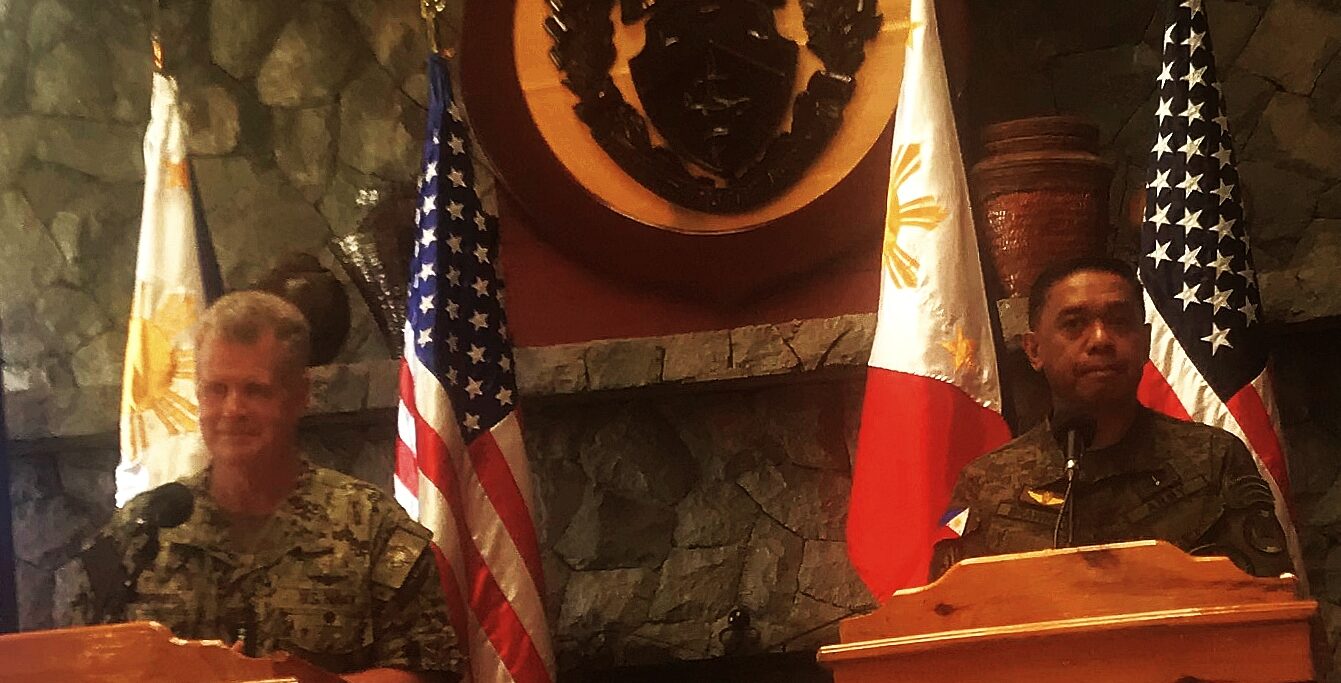
SIDE BY SIDE US Adm. Samuel Paparo and Armed Forces of the Philippines chief of staff Gen. Romeo Brawner Jr. stand side by side during the Mutual Defense Board and Security Engagement Board meeting held at the Philippine Military Academy in Baguio City on Aug. 29. —VINCENT CABREZA
FORT DEL PILAR, BAGUIO CITY—The country’s premiere military school will determine how its cadets could take part in joint military drills for the defense of Philippine marine territory, Armed Forces chief of staff Gen. Romeo Brawner Jr. said here Thursday.
The Philippine Military Academy (PMA) has been exposing its cadets to the emerging global and domestic problems they may confront as commissioned junior officers once they graduate, said Brawner at the Baguio leg of the 2024 meeting of the Mutual Defense Board and Security Engagement Board with the United States.
READ: Water cannon use part of PH-Vietnam drills in WPS
According to Brawner, the cadets undergo their own military service exercises as part of the curriculum, but joining larger training programs like the annual “Balikatan” Exercises would “expand the experience of our cadets, and not just [rely on] training among themselves.”
But Navy Rear Adm. Caesar Bernard Valencia, who was appointed PMA superintendent in July, would need to review the training schedules of the Corps of Cadets to find out who may fit in with the next iteration of Balikatan, said Brawner.
Last year’s Balikatan took place from April to May in Batanes and Palawan.
“The cadets have different training schedules, and April and May are the start of their academic subjects,” said Brawner, a Baguio native and a member of PMA “Makatao” Class of 1989, who served as the academy’s commandant of cadets in 2019.
American Adm. Samuel Paparo, who heads the US Indo-Pacific Command, touted the 2025 Balikatan as the largest “multidomain” exercises yet since the program began 39 years ago, and would involve the different ground, air and naval combat services in a “full and comprehensive rehearsal” of joint maritime defenses.
Brawner said he hoped the respective legislatures of the Philippines and Japan would ratify a “reciprocal access agreement,” that would allow Tokyo to participate in the 2025 Balikatan.
Paparo also spoke to the Corps of Cadets about his country’s binding alliance with the Philippines at a closed-door event at the military school’s Mess Hall.
‘Future-proofing’
In his assumption speech during the PMA command turnover ceremony on July 20, Valencia said the PMA under his watch would start “future-proofing” the prospective military commanders serving in future decades of the 2050s and 2060s, given the global changes that occur at “breakneck speed.”
“The geopolitical landscape has changed, alliances have shifted, environmental issues have taken center stage and information and technology are now the [world’s] currency,” said Valencia, a member of the PMA “Bigkis Lahi” Class of 1990 who served as the Navy’s acting flag officer in command in 2022.
He replaced Army Lt. Gen. Rowen Tolentino, a classmate of Brawner who led the command transfer.
Valencia said the cadets “live in an era where innovation and technology are measured in mere moments [which is] outpacing our propensity to use this knowledge for the greater good.”
“We need critical thinkers [in the AFP] who can see beyond the obvious, are able to communicate ideas clearly and succinctly and have the ability to collaborate with nontraditional partners. We need future officers who are creative in solving problems characterized by a world that is volatile, complex and ambiguous,” he said.
Tracking surveys
The PMA also plans to employ tracking surveys to find out if foreign intrusions into Philippine territories like the West Philippine Sea have driven the country’s Generation Z (Filipino teenagers and young adults in their early 20s) to consider a military career by applying in the PMA, according to Maj. Maria Charito Dulay, the PMA spokesperson.
Cadet aspirants write essays about themselves as part of their entrance applications, she said, and a majority expressed their broad desire to serve the country and help their families, she said.